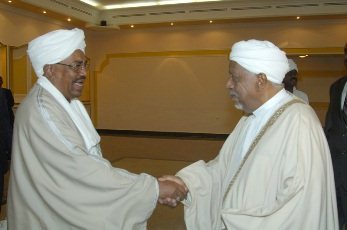Al-Mirghani says DUP will not pull out of Sudan government
July 6, 2012 (KHARTOUM) – The leader of the ex-opposition Democratic Unionist Party (DUP) in Sudan, Mohammed Osman Al-Mirghani, has ruled out the possibility of his party’s withdrawal from the government, saying the country needs domestic cohesion to face what he described as “real threats and risks”.

The decision of one of Sudan’s biggest opposition parties to join the government has created a great deal of internal dissent that saw many members quitting in protest. The party received three ministries in the federal cabinet.
In an interview published by the London-based Al-Sharq al-Awsat on Friday, Al-Mirghani was asked whether his party intends to leave the government. His response was that the decision to join the government was subjected to intensive internal consultations which arrived at the conclusion that the dictates of “national interests” and the “need to confront the threats surrounding the country” compels the DUP to participate.
Therefore, he intoned, the decision to withdraw is “not a whim” but “a big responsibility”. He went on to say that at this particular stage Sudan is facing “real threats and risks” that require cohesion of the internal front and national consensus to face them.
Al-Mirghani concluded that his party will “remain committed” to the national program it signed with the NCP.
The DUP is finding itself in a delicate situation as anti-regime protests originally sparked by government austerity plans have been gripping the capital and other regional towns for the last three weeks.
Activist groups say the aim of the protests is to oust the regime of President Omer Al-Bashir, which they accuse of a long list of failures including rampant corruption, misguided economic policies and overspending on security and defense at the expense of health and education sectors.
Al-Mirghani admitted that the living conditions of all citizens are “very tough”. He claimed that his party had tried to dissuade the NCP from its austerity plan arguing that economic reforms must be geared towards mitigating the suffering of citizens not increasing it.
Sudan has been grappling with soaring inflation and a depreciating currency since the then semi-autonomous region of South Sudan split in July last year and took with it three-quarters of the country’s oil production.
Inflation exceeded 30 percent in May, mainly on food prices, while the Sudanese pound reached a record-low exchange rate of 6 pounds against the US dollar in the local black market for hard currency.
Asked on where he stands on post-secession negotiations between Sudan and South Sudan, Al-Mirghani blamed Juba’s negotiators for the lack of progress in the talks, saying they keep coming up with new maps that could be termed “a declaration of war”.
Recent rounds of negotiations between the two neighbours stalled due to disagreements over disputed territories. Khartoum says South Sudan presented a map including areas belonging to Sudan as established by the 1956 border strip, while Juba says these areas originally belong to South Sudan but were annexed by Khartoum.
(ST)
